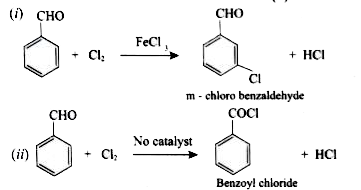How is chlorine react with Benzaldehyde?
(i) In the presence of catalyst
(ii) in the absence of catalyst
Topper's Solved these Questions
- CARBONYL COMPOUNDSBOOK - FULL MARKSCHAPTER - CARBONYL COMPOUNDSEXERCISE - ADDITIONAL QUESTIONS (5 MARKS QUESTIONS)
34 Videos
- CARBONYL COMPOUNDSBOOK - FULL MARKSCHAPTER - CARBONYL COMPOUNDSEXERCISE - ADDITIONAL QUESTIONS (2 MARKS QUESTIONS)
67 Videos
- BIOMOLECULES BOOK - FULL MARKSCHAPTER - BIOMOLECULES EXERCISE - ADDITIONAL QUESTIONS (5-MARK QUESTIONS)
12 Videos
- CHEMICAL KINETICSBOOK - FULL MARKSCHAPTER - CHEMICAL KINETICSEXERCISE - ADDITIONAL QUESTIONS (5 MARK QUESTIONS)
10 Videos
Similar Questions
How will propene react with HBr (i) in the presence of peroxide (ii) in the absence of any peroxide ?
View SolutionThe activation energy for a first order reaction is 60 kJ mol−1 in the absence of a catalyst and 50 kJ mol−1 in the presence of a catalyst. How many times will the rate of reaction grow in the presence of the catalyst if the reaction proceeds at 27∘C ?
View Solution
Knowledge Check
The presence of a catalyst
Aincreases the heat of reactionBdecreases the heat of reactionChas no effect on the heat of reactionDhas no effect on the energy of activationChlorine reacts with benzaldehyde to give :
Abenzyl chlorideBbenzal chlorideCbenzoyl chlorideDchlorobenzeneHDP IS Formed in the presence of catalyst
AperoxideBZiegler-nattaCH2NlDBr2Nl
The activation energy for a first order reaction is 60 kJ mol−1 in the absence of a catalyst and 50 kJ mol−1 in the presence of a catalyst. How many times will the rate of reaction grow in the presence of the catalyst if the reaction proceeds at 27∘C ?
View SolutionThe activation energy for a first order reaction is 60 kJ mol−1 in the absence of a catalyst and 50 kJ mol−1 in the presence of a catalyst. How many times will the rate of reaction grow in the presence of the catalyst if the reaction proceeds at 27∘C ?
View SolutionHDPE is formed in the presence of catalyst
View SolutionDihydrogen reacts with CO at 700 K in the presence of a catalyst to form methanol, the catalyst is:
View SolutionDihydrogen reacts with CO at 700 K in the presence of a catalyst to form methanol, the catalyst is
View Solution

